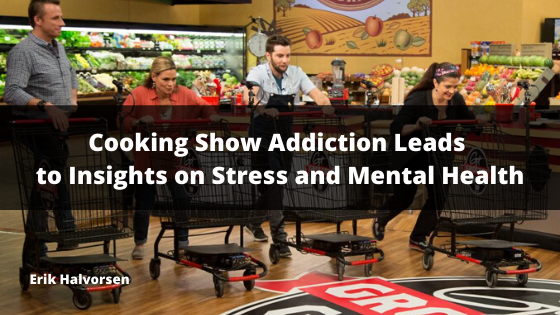I have something to confess: I am a cooking show junkie. There I feel much better. I watch the standard cooking shows where a chef like Ina Garten or Tyler Florence banters gleefully in front of a camera, seemingly talking directly to you while giving step-by-step instructions on how to whip up a steak au poivre with a veal demi-glace while sharing vignettes about cooking with their famous Hollywood friends that they are on a first-name basis with.
And I have passed on my cooking show obsession to my kids. I call it educational programming since we take what we learn into the kitchen where we often cook together. I am absolutely positive that my kids can kick your kids’ butts when it comes to whipping up a seriously authentic and tasty guacamole. And I guess that’s the competitive streak in us because what my kids and I really enjoy are the cooking competitions, such as Chopped, Guy’s Grocery Games, Beat Bobby Flay, Worst Chefs in America, Kids Baking Championship and Master Chef.
We have great debates on who will get “chopped.” We critique the contestants plating skills with the elitist arrogance of Geoffrey Zakarian. We groan knowingly with Scott Conant and Alex Guarnaschelli when a contestant reaches for truffle oil in a desperate last second attempt when we know it will overwhelm the more subtle and nuanced flavor of the artichokes in the dish. Everyone knows that Elizabeth! Put the truffle oil down for Pete’s sake! You are not on a train to Flavortown; you have a one way ticket to Chopped City. . .and now I must ask for your apron.
I know. . .it’s a problem. . .and now I have passed my competitive culinary problem on to my kids.
Yet, my personal favorite cooking show format is the travelogue. I am not sure who gets credit for starting or popularizing this format, but I do remember first watching and being intrigued by LifeStyles of the Rich and Famous in the 80’s. I was pretty young, but even then I was drawn to the “champagne wishes and caviar dreams” that Robin Leach was peddling. It looked fantastic. I didn’t even know what a 50-year old Montrachet and beluga caviar were, but it sure looked awesome to be sipping and snacking on them in Monaco next to a Rolls Royce and what my 10-year-old brain assumed was a Sports Illustrated model.
This format certainly evolved as celebrity travel chefs like Anthony Bourdain and Andrew Zimmern connected the audience to the “other half:” the common man, street vendors, indigenous people and grandmas. They wanted to show us that we could not truly understand a culture by looking at what the rich and famous eat. They wanted to make the world smaller and more accessible for all us—many of us who would never see these locations in our lifetime. They wanted us to understand the history and the people through their food and customs. They did it exceedingly well and, damn, they looked like they were having a lot of fun doing it too! Wouldn’t you have fun? Is there a better job in the world than being paid to travel to exotic locations, meet interesting people, learn about their culture all while eating amazing food? I don’t think there is a better job. Look, I love what I do for a living, but don’t get me wrong; if the Travel Channel or Food Network offered me Andrew Zimmern’s job tomorrow, I would take it in a heartbeat. (Call me.)
This is why I was truly shaken when Anthony Bourdain took his own life. Not because I knew him personally or even convinced myself that I knew him just because I had watched every episode of No Reservations. I am not that naïve. But myopically, I viewed this man as someone who had it all—family, fame, wealth and my dream job. So how could someone who seemed to have everything turn on himself and end it all? It is a question that rattles around in my brain and occupies my thoughts to no successful epiphany every time I see an episode of No Boundaries (or a Robin Williams movie).
From what I have read since he committed suicide in June 2018, Bourdain had evidently been suffering from depression and anxiety for many years. He experienced the highs and the lows of being a world-renowned celebrity chef, NY Times bestselling author, award winning TV host and widely revered by his culinary peers. It is still hard to comprehend.
Another great chef and entertainer that passed away in 2019 was Carl Ruiz, a frequent contestant and judge on Guy’s Grocery Games. He brought his authentic Cuban cooking into the TV cooking competition world and won—often. Ruiz successfully opened and ran several restaurants over 20 years while also dealing with the stress of closing restaurants and divorce. He was known among his colleagues for having a zeal for life and sense of humor (known as “Ruizing”) that got everyone laughing. Sadly, Carl Ruiz died way too young in September of 2019 of atherosclerotic cardiovascular disease. Yet, he is one of many celebrity chefs that deal (dealt with) personal issues.
Cookbook author and Food Network star Katie Lee has been public with her infertility struggles. She and her husband have tried in-vitro fertilization (IVF) and she has shared her experiences on social media. Although I certainly do not know her personally and do not have that same fertility experience to draw from, I can only imagine that these events have taken a toll on Katie mentally and physically. Social media is a tricky thing, but I certainly applaud her for sharing her story where she is inspiring others and receiving an outpouring of support.
These chefs, just like athletes, celebrities, and wealthy business leaders have their own struggles despite the fame and success they achieved. It is important to know that no one is immune to the challenges that life throws at us all and to paraphrase an internet meme:
”No amount of money will make you happy if you aren’t happy with yourself.”
The only rational conclusion I can draw from these tragic losses of life is this: everyone is struggling with something and not all struggles are the same or visible. Also, not everyone has the tools to deal with them. Please reach out to someone, anyone, if you or someone you know is struggling or needs help with a mental health issue.
Erik Halvorsen is a devoted father, loving husband, and ambitious innovator; he is consistently searching for new technology to help cure diseases, benefit patients’ lives, and change how we experience healthcare. He was named one of the top 30 Chief Innovation Officers in healthcare in the country, and he has been listed as one of the Top 40 Under 40 in Boston. Erik is also a member of the Forbes Technology Council.

